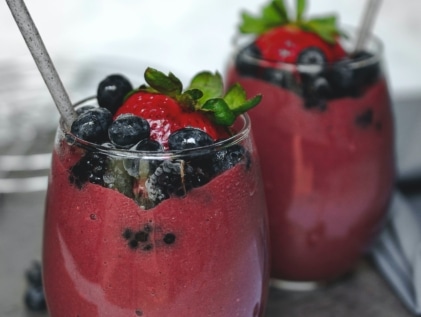Smoothies have become increasingly popular in the past few years, with just about every age group getting in on the trend. The variety of smoothies, both healthy and not-so-healthy, is mind-boggling. When it comes to finding the best and healthiest smoothies, this adage comes to mind: What goes in determines what comes out!
There are several types of smoothies out there, both homemade and store-bought, but most can be classified into one of the following categories:
- Fruit smoothies: As the name indicates, this kind of smoothie usually features one or more types of fruit blended with fruit juice, water, milk, or ice cream.
- Green smoothies: Green smoothies pack leafy green vegetables and fruit blended with water, juice, or milk. They tend to be heavier in veggies than regular smoothies, though they often include a little fruit for sweetness.
- Protein smoothies: Protein smoothies usually start with one fruit or vegetable and a liquid, as well as a good source of protein such as Greek yogurt, cottage cheese, silken tofu, or protein powder.
These versatile beverages are portable, family-friendly, and can be easily modified for any taste or dietary preference. Smoothies are easy to prepare at home with a kitchen blender or the very popular Nutribullet blender. But fresh and bottled smoothies are turning up everywhere commercially, from specialty smoothie shops to grocery store bottled versions.
It’s been estimated that only 12 percent of adults in the United States are eating enough fruit each day, and that number drops to 10 percent for vegetables, according to the Centers for Disease Control (CDC). Smoothies can be a quick and delicious way for everyone in your family to get in the recommended 2.5 cups of vegetables and 2 cups of fruit every day.
Ideally, a healthy smoothie will be loaded with fresh or frozen fruits and veggies, or a combination of both, as well as a low-sugar liquid. Together, these nutrients may reduce inflammation, improve digestion, and lower your risk of chronic conditions like heart disease, osteoporosis, obesity, and age-related mental decline. A boost in fiber intake from veggie and fruit-laden smoothies is also linked to a reduced risk of type 2 diabetes and heart disease. (But a lot of high-calorie and high-sugar ingredients end up in store-bought brands, so be sure to check the labels before buying!)
The most basic smoothie starts with two essential ingredients—a base and a liquid. From there you can combine ingredients to your heart’s content!
Popular ingredients in homemade and store-bought smoothies include:
- Fruits: berries, banana, apple, peach, mango, and pineapple
- Vegetables: kale, spinach, arugula, wheatgrass, microgreens, avocado, cucumber, beetroot, cauliflower, and carrots
- Nuts and seeds: almond butter, peanut butter, walnut butter, sunflower seed butter, chia seeds, hemp seeds, and flax meal
- Herbs and spices: ginger, turmeric, cinnamon, cocoa powder, cacao nibs, parsley, and cold brew coffee
- Sweeteners: maple syrup, raw sugar honey, pitted dates, simple syrup, fruit juice concentrates, stevia, ice cream, and sorbet
- Other: cottage cheese, vanilla extract, soaked oats, cooked white beans, silken tofu, and dairy or nondairy yogurt
Although smoothies are frequently marketed as a weight-loss tool, this can be a slippery slope! Research suggests they may be effective for this purpose as long as you’re not exceeding the daily calorie needs. While some find smoothies an easy way to monitor food portions and stay on top of their weight loss goals, others may not feel as full when they drink their calories rather than eating them. (As always, discuss any dietary changes with your doctor.)
If you know that you’re not the best at getting your daily 5-8 servings of produce, smoothies can be a convenient way to pack in more veggies and fruit into your diet. Generally, the healthiest smoothies will be those that you make yourself, because you can include the healthiest ingredients and avoid any added sweeteners. Smoothies can either be a nutritious addition to your diet or they can destroy your efforts. Skip the sugar-heavy smoothies and opt instead for one that is full of whole foods with no added sweeteners.
For a selection of delicious smoothie recipes, check these out. Enjoy!

